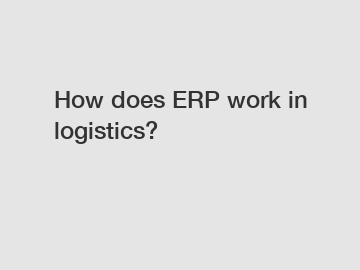How does ERP work in logistics?
How does ERP work in logistics?
In today's fast-paced business environment, effective logistics management is crucial for companies to stay competitive. An integral part of logistics management is Enterprise Resource Planning (ERP) software, which enables organizations to streamline operations, enhance visibility, and improve overall efficiency. But how exactly does ERP work in logistics, and what benefits does it bring? Let's delve into this topic and explore the various aspects of ERP in logistics.
1. Centralized Data Management:

One of the primary functions of ERP in logistics is centralizing data management. It allows companies to store all relevant information, such as customer details, shipping records, inventory levels, and supplier information, in a single system. This comprehensive view of information streamlines operations, eliminates data silos, and enables better decision-making.
2. Enhanced Visibility and Transparency:
ERP systems offer real-time visibility across the entire supply chain, providing logistics managers with the necessary insights to make informed decisions. Through ERP, businesses can track inventory levels, monitor shipments, and analyze data on various performance metrics. This visibility helps identify bottlenecks, reduce lead times, and ensure optimal resource allocation.
3. Efficient inventory management:
With ERP, logistics managers can efficiently manage inventory levels, which is critical for smooth operations. ERP systems allow organizations to monitor stock levels, track product movements, and automate reorder points. Additionally, ERP software provides accurate demand forecasting, minimizing stockouts and reducing excess inventory.
4. Integrated Workflow:
An ERP system integrates various departments, like procurement, inventory management, shipping, and finance, into a unified platform. This integration enables seamless collaboration, data sharing, and process automation across functions. Consequently, organizations can streamline their workflows, eliminate manual errors, and reduce time spent on repetitive tasks.
5. Supply Chain Optimization:
By integrating logistics processes into an ERP system, businesses can optimize their supply chain operations. ERP enables effective demand planning, supply chain visibility, and coordination with suppliers. For instance, the system can automatically generate purchase orders based on inventory levels and pre-defined reorder points, ensuring a continuous supply of materials and minimizing stockouts.
6. Effective Warehouse Management:
ERP systems play a vital role in optimizing warehouse operations. They enable businesses to track inventory movements, manage bin locations, and streamline order fulfillment processes. With ERP, warehouse managers can efficiently allocate space, reduce picking errors, and enhance overall warehouse productivity. Moreover, it facilitates efficient handling of returns and improves customer service.
7. Accurate Financial Management:
ERP in logistics provides robust financial management capabilities. It integrates financial data with logistics operations, enabling organizations to track costs, generate accurate invoices, and manage accounts payable and receivable. Furthermore, the system allows for real-time financial reporting and analysis, providing insights into profitability, cost drivers, and potential areas for improvement.
In conclusion, ERP plays a fundamental role in logistics management by streamlining operations, enhancing visibility, and optimizing processes. With centralized data management, organizations can efficiently track inventory, manage warehouse operations, and collaborate across departments. The integration of logistics processes into an ERP system enables effective supply chain optimization, accurate financial management, and enhances overall efficiency. By leveraging ERP in logistics management, businesses can achieve better control, improved customer service, and gain a competitive edge in today's dynamic marketplace.
Want more information on digital Parcel logistics software, saas parcel fulfillment software, customizable top 10 logistics software? Feel free to contact us.

Comments
0